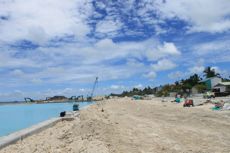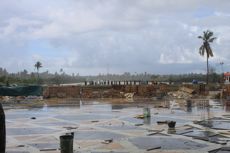Sri Lankan newspaper The Island has published a two-part interview with Abdulla Luthufee, a Maldivian businessman once sentenced to death for his role in the 1988 coup attempt.
“I wanted to get rid of [former President Maumoon Abdul] Gayoom at any cost. As the election process in my country never gave a reasonable opportunity to the opposition, I felt an outside force should be used to oust Gayoom,” The Island reported Luthufee as saying, on the 23rd anniversary of the November 3 coup attempt.
“Due to my close association with the then PLOTE (People’s Liberation Organization of Tamil Eelam) leader Uma Maheswaran, I negotiated for the deployment of an 80-member strong PLOTE raiding party. In fact, we discussed the sea-borne raid since 1987 after the deployment of the Indian Peace Keeping Force in the Northern and Eastern Provinces of Sri Lanka in line with the July 1987 Indo-Lanka peace accord.”
Eighty Tamil mercenaries land on Male’ on November 3, 1988, and quickly took over the airport. However they were caught in a shoot out with military forces in Male’ and were forced to retreat after India deployed 1600 paratroopers to the Maldives on Gayoom’s request.
“Luthufee and another Maldivian had joined a heavily-armed PLOTE contingent on the night of October 29, 1988 on the Mollikulam beach,” writes Sri Lankan journalist Shamindra Ferdinando.
“They left the north-western shores at about 8.30am in two 40-foot long fishing trawlers. Luthufee had the support of several key persons in the Maldivian military, ex-Major Abbas Ibrahim, ex-Corporal Abdulla Shahid and Umaru Jamaal. The trawlers reached Male at 4:30am on November 3, 1988, and having secured the beach without a fight, the group divided into over half a dozen groups and moved to specific targets, including the army barracks, the President’s house and the Deputy Defence Minister’s residence,” Ferdinando writes.
Despite Luthufee’s professed confidence that the coup would be bloodless, nineteen were killed in heavy fighting after the plan fell apart when the PLOTE contingent tasked with taking over the army barracks opened fire on the base rather than entering through a lightly-guarded entry point.
“Had they entered the barracks, the majority [inside] would have thrown their weight behind us. We lost the group leader, and thereby the initiative,” Ferdinando reported Luthufee as saying.
“I didn’t want to kill anyone. I believed those loyal to Gayoom would give up quickly. They wouldn’t have been a match for the experienced PLOTE cadres. Unfortunately, due to hasty action on the part of the group tasked with seizing the army barracks, we gave the game away.”
Further support from rebels already in Male’ failed to materialise, “and the absence of their support made us vulnerable and automatically strengthened Gayoom’s position. But still we could have achieved our military objectives if those assigned to seize Gayoom had succeeded.”
Gayoom eluded the PLOTE team sent to his residence, and was able to contact the Maldivian ambassador in Colombo, Ahmad Abdulla “and Ali Manisha, his Singapore-based advisor.”
The-then Sri Lankan government offered elite troops to quell the coup attempt. Gayoom also reportedly requested assistance from both the UK and US governments.
Then US State Department spokesman Charles Redman told US media at the time that the Maldivian government had asked for assistance in putting down the coup attempt, prompting it to establish a working group to monitor the events.
“The United States and India want to protect the interests of the Maldives government because this is an elected government subject to attack and it has requested assistance,” Redman said at the time.
However eventually it was India that was able to quickly deploy paratroopers and force the rebels to flee.
“We didn’t have a way to escape as we allowed the trawlers to leave as we were confident of seizing control. There was total chaos,” Luthufee told The Island.
“During gun battles we lost two PLOTE personnel, while several received gunshot injuries. We retreated towards the Male’ harbour as Indian paratroopers landed in the capital. We didn’t have any other option other than to seize the Maldivian vessel, MV Progress Light. We got away at about 11am and left the bodies of two PLOTE cadres killed in action. Three PLOTE personnel trying to get away in a rubber dingy were captured.”
The retreating PLOTE group took a small group of hostages, including serving Transport Minister Ahmed Mujuthaba and his wife, and attempted to flee towards Java in Indonesia via waters between India and Sri Lanka.
“We believed the presence of hostages, particularly a minister and his wife, gave us an advantage over those pursuing us,” Luthufee told The Island. “An Indian military helicopter maintained constant surveillance, while we proceeded towards our target. But on the following day at about 4:30pm our radar picked up two objects, and we knew the Indian navy was on its way to intercept us. One of the vessels, subsequently identified as INS Gadavari fired at our ship, though it didn’t cause any serious damage. We kept on course. They contacted us over the ship’s radio and demanded the immediate surrender or face the consequences. A five-member Maldivian defence team, including Major Adam Saheer, was on the Indian warship.”
The pursuing vessel demanded that the fleeing rebels set course for either an Indian or Maldivian port.
“We refused to give in. We demanded mid-sea negotiations to settle the dispute. The Indians started firing at our ship at the behest of the Maldivians onboard their vessel. The PLOTE commander got in touch with their headquarters in Sri Lanka and sought instructions. They received instructions to execute one hostage and throw his body to the sea. In spite of the Maldivian minister in captivity making a desperate bid to avoid the execution of one of the hostages, the PLOTE took one person to the deck and shot him. They threw the body [overboard] and the Indians recovered it. The remaining hostages volunteered to come on the main deck in a bid to discourage the Indians from firing at us. But the Maldivians onboard the Indian warship wanted all of us killed,” Luthufee claimed.
INS Gadavari gave the rebels three hours to surrender unconditionally “or face the consequences.”
“We didn’t stop but proceeded towards Sri Lankan waters. We were about 30 nautical miles away from our position when the Indians opened up with big guns. The minister was among the persons hit during the initial fire. We didn’t fire back as Indian ships were out of the range of our guns. I directed the Filipino engineer to stop the engine. As I was watching him killing the engine, he was hit. We were ordered to jump into the sea and were rescued by the Indians immediately after we raised a white flag.”
Luthufee told The Island he was blindfolded and locked in a toilet on board the Indian vessel as the warships turned back towards Male’, leaving the MV Progress Light to sink behind them.
Speaking to Minivan News in November 2010, South Asian security expert Professor Stephen Cohen recalled his time at the US State Department and noted US involvement in tracking suspected players in the failed 1988 coup.
“It’s a little known fact,” he said. “A passing American vessel transiting in the area picked up the escaping ship and pointed [the pursuers] towards it. I had only just left the State Department but I heard about it. It was a pivotal moment in the country’s history, and its purpose was never quite clear.”
The INS Gadavari reached Male’ to a waiting crowd of Indian journalists a senior military officials, Luthufee recalls, and their presence “prevented Gayoom loyalists from harming us.”
According to The Island’s story, Luthufee was first taken before Gayoom and then to another island, where he was interrogated by Indian intelligence.
“I had an opportunity to tell Indian intelligence what was going on in my country. I have no doubt the Indians realized that the vast majority of people hated Gayoom and his cronies. I won the confidence of the Indians and I have no doubt those in charge of handling the Maldivian issue quickly recognized the need for reforms. Gayoom resented the Indian attitude and moved me to another prison on a different island, where I was held for 11 months,” Luthufee was reported as saying.
Once the Indian witnesses had departed he alleged he was tortured and humiliated in custody. He along with Ex-Major Abbas Ibrahim, ex-Corporal Abdulla Shahid, Ahmed Nasir and 12 captured Tamils received the death penalty, while three others received prison terms: Umaru Jamaal Sikka, Ahmed Ismail Maniku, and Mohamed Naeem.
“Under Gayoom the Maldivian judiciary was nothing but a farce. It was a tool in the hands of Gayoom and his cronies, who used and abused Maldivian law to pursue their agenda. They sought to consolidate their power at the expense of the freedom of the ordinary Maldivians, the vast majority of whom lived a simple life,” Luthufee was reported as saying.
Luthufee credited his survival to the intervention of Indian head of state Rajiv Gandhi, who reportedly summoned Gayoom to New Delhi on September 16, 1989, less than a month after the death sentences were passed, and demanded that they be repealed .
“All of us are grateful to those Indian intelligence officers for briefing the Indian political leadership regarding the Maldivian political crisis. Thanks to them, Gayoom couldn’t deceive the Indian leader,” Luthufee told The Island.
“Gayoom flew back to Male on September 17, 1989. Obviously, he was a dejected man. He declared that he didn’t want to shed anymore blood in Male and commuted capital punishment imposed on us to life imprisonment. We were moved to special cells, which were surrounded by a steel fence at the same facility where we were held. Gayoom’s men enjoyed torturing prisoners. They were rewarded by their masters for being beastly to their fellow countrymen.
Luthufee was reported in The Island as expressing no regret for his role in the failed coup.
“Even now, Gayoom is not happy being an ordinary Maldivian. The ousted leader wanted power at any cost and was trying to undermine the present leader. Maldivians should be cautious of those seeking to play politics at their expense.”
Read the article as it originally appeared in The Island:
Part one (English)
Part two (English)
Likes (0)Dislikes
(0)Dislikes (0)
(0) 
